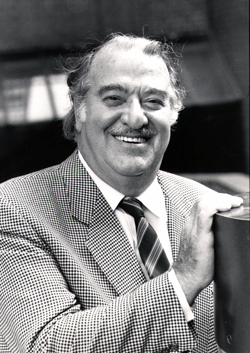Giuseppe Taddei (Giuseppe Taddei)

In a nearly 60-year career Giuseppe Taddei left his mark in baritone roles both tragic and villainous, and as a basso-buffo, opera’s comic relief. Raised in Genoa, he started attending the opera with his mother as a toddler, and was soon entertaining his parents’ friends. (One legend has him at around age eight singing on the steps of a church to earn money for his less well-off friends’ schoolbooks). After study in Rome, his winning of a Rome Opera competition led to his 1936 professional debut there as the Herald in Wagner’s “Lohengrin”, in a performance conducted by Tullio Serafin. Taddei became a stalwart in Rome over the next few seasons performing, among other fare, the title leads in Verdi’s “Macbeth” and “Rigoletto”, Baron Scarpia, the evil police chief of Puccini’s “Tosca”, both Rossini and Mozart’s Figaros, Mozart’s “Don Giovanni” as well as the Don’s valet Leporello, Puccini’s hilarious crooked lawyer “Gianni Schicchi”, and two comic roles from the same Donizetti creation, Sergeant Belcore and Dr. Dulcamara, the traveling quack who sells “L’Elisir d’amore”. Taddei’s World War II military service was bizarre: drafted into the Italian Army and sent to Yugoslavia, he somehow managed to be captured by the Germans and shipped to a concentration camp. Liberated by the Americans, he sang for the officers and troops, many of whom would become his fans in later years. At the end of the war he made his debut at the Vienna State Opera, took his London bow at the Cambridge Theatre in 1947, and in 1948 was first seen at the Salzburg Festival, at Teatro San Carlo, Naples, and at La Scala Milano. Giuseppe Taddei had his American debut at San Francisco as a much-praised Macbeth, also receiving good reviews for his Baron Scarpia; Lyric Opera of Chicago first heard him in 1959 as Barnaba in Ponchielli’s “La Gioconda” opposite Eileen Farrell. As far back as the mid-1950s, there were negotiations for him to appear at New York’s Metropolitan Opera, but he objected to the offers of low pay, small roles, and mostly to the disrespect shown by General Manager Rudolf Bing in wanting to subject an established star to an audition. Giuseppe Taddei was a regular at London’s Covent Garden between 1960 and 1967, mostly appearing in Verdi roles such as Rigoletto, Macbeth, and as Iago from “Otello”. He finally made it to the Metropolitan on September 25, 1985, receiving a long ovation for his portrayal of Verdi’s incarnation of Shakespeare’s fat knight “Falstaff” in a performance led by James Levine. Due to his late start, the Metropolitan was only to host him 21 times, his lone character there besides Falstaff being Dr. Dulcamara. Possessing a sound technique, he remained a star on major operatic stages well into his 70s. At his death, he left a massive recorded legacy, both serious and comedic, dating from the early 1940s thru his entire time before the public; much of this remains available on CD and DVD.
Born
- June, 26, 1916
- Italy
- Genoa, Liguria
Died
- June, 02, 2010
- Rome, Italy



